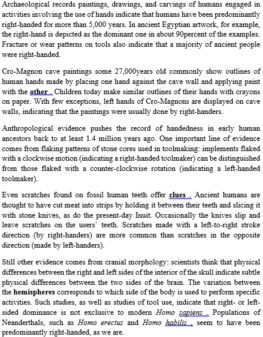* Read the following passage and mark the letter A, B, C, or D on your answer sheet to indicate the correct answer to each of the questions from 24 to 30.
Weather forecasting
Cyclones in India, hurricanes in the Caribbean - severe weather events make news headlines almost weekly. Yet even in Britain, which has comparatively few climate extremes, the country is still governed by weather. If it’s pouring with rain the British might stay indoors or go to the cinema; if it’s fine they’ll have a picnic.
Most people nervously study the weather forecast the evening before if they’ve got an important appointment the following day. Even if they have nothing planned, the weather often affects their mood.
For individuals, the worst that can usually happen if the weather catches them on the hop is that they get wet. For business, the effects are far more serious. Airlines and shipping companies need to avoid severe weather and storm-force conditions. Power companies need to make sure they can supply the demand for electricity in cold weather; farmers plan their harvests around the forecast and food manufacturers increase their production of salads and other summer foods when fine weather is promised.
So who or what do meteorologists - weather forecasters as they are more commonly known - rely on when it comes to producing a forecast? Ninety percent of the information comes from weather satellites, the first of which was launched into space nearly forty years ago and was a minor revolution in the science of forecasting. Up until then, forecasters had relied on human observers to provide details of developing weather systems. As a result, many parts of the world where there were few humans around, especially the oceans, were information-free weather areas. Today, however, satellites can watch weather patterns developing everywhere.
In the UK meteorologists have also relied on releasing four weather balloons a day from eight fixed sites. These balloons measure wind, temperature and humidity as they rise upwards to a height of about 26,000 metres.
Some commercial aircraft can also be fitted with a range of forecasting instruments although this system has certain disadvantages. For example, it can provide a great deal of information about the weather on popular routes, such as London to New York, but little about the weather on more out-of-the way routes.
Instruments aboard ships can also supply basic weather information as well as important data on wave height. Generally, the range of these instruments is fairly limited but they can indicate which direction rain is coming from, how low the cloud is and give an idea of when the weather system will reach land.
One forecaster who has made a name for himself is a man called Piers Corbyn, who bases his forecasts on watching the Sun. Most forecasters will offer forecasts for only 10 days ahead, but Corbyn’s forecasts are for 11 months. Although most meteorologists believe that there is no scientific basis for his work, Corbyn’s forecasts are used by insurance companies who want to plan months in advance.
The weather system affects people’s lives in Britain____________.
A. despite being fairly moderate.
B. because it is so changeable.
C. because it is always raining.
D. despite being very seasonal.






Hệ thống thời tiết có ảnh hưởng đến những người sống ở Anh quốc.
Đáp án A: Mặc dù khá ôn hòa.
Các đáp án còn lại:
B. Bởi vì nó có thể thay đổi
C. Bởi vì trời luôn mưa
D. Mặc dù rất mùa vụ
Thông tin trong bài:
Yet even in Britain which has comparatively few climate extremes, the country is still governed by weather. If it’s pouring with rain the British might stay indoors or go to the cinema; if it’s fine they’ll have a picnic.
Mặc dầu vậy, ở Anh, nơi có khí hậu không quá là khắc nghiệt, đất nước vẫn bị ngự trị bởi thời tiết. Nếu như trời đang mưa thì người Anh có thể sẽ ở nhà hoặc đi rạp chiếu phim; nếu trời đẹp họ sẽ đi picnic.
25 D Người viết có ý gì qua cụm từ ‘làm khó ai’